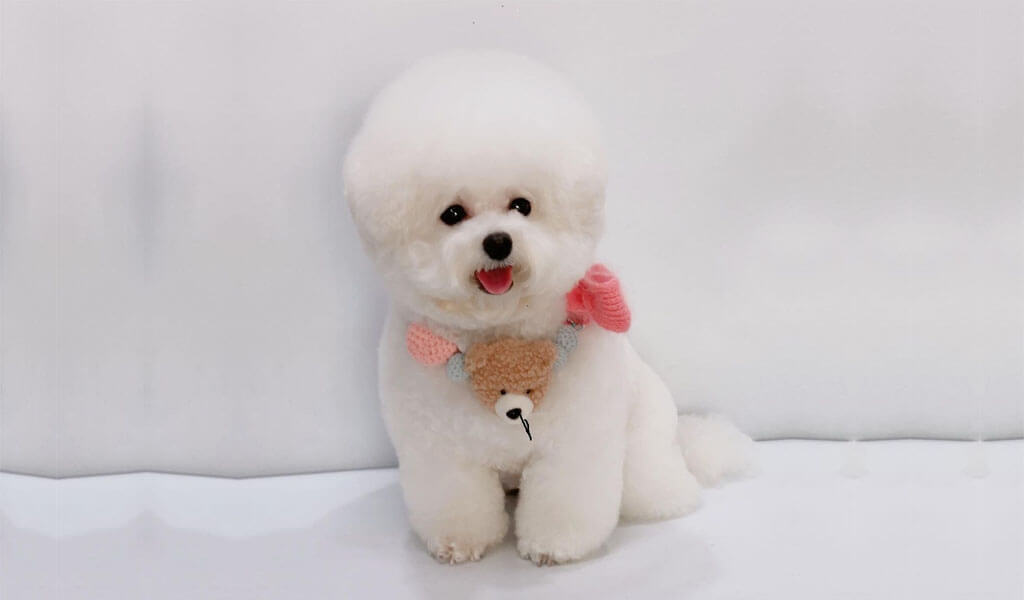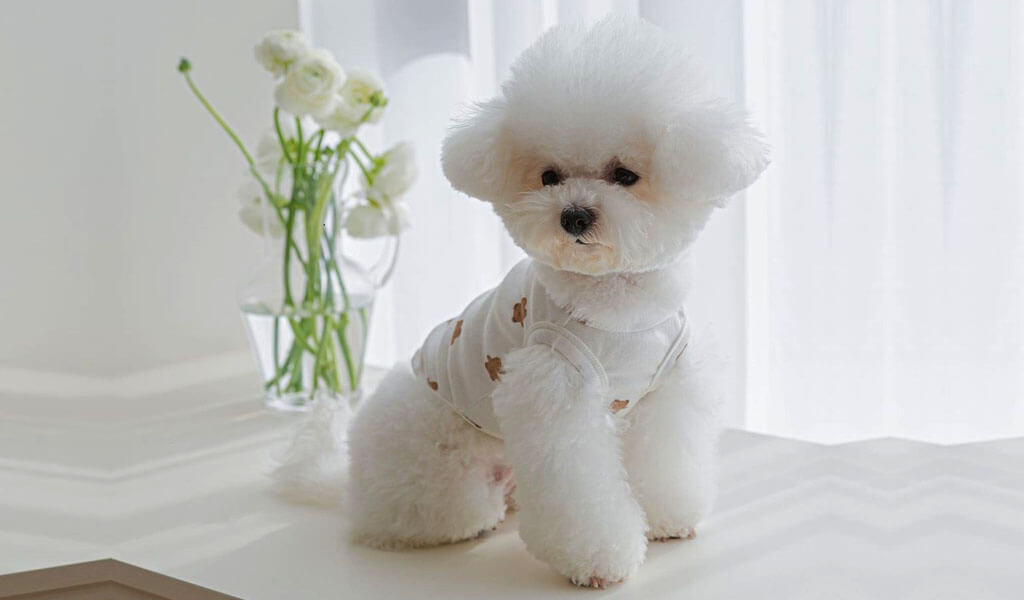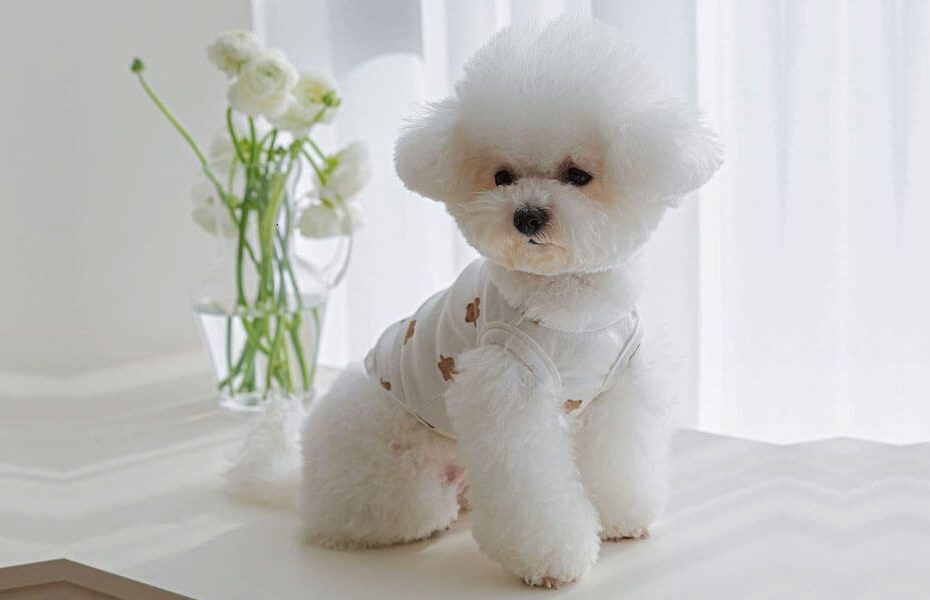The Bichon frise is a happy, little dog breed that enjoys mischief and has a lot of love to give. The Bichon frise is one of the most loving and affectionate dog breeds. He enjoys being the focus of attention. They’re extremely lively and clever, and even inexperienced pet owners and apartment dwellers will like these dogs.
Highlights/Contents
- History
- Appearance
- Characteristics
- Temperament
- Training and Activity
- How to Care
- Health
- Puppy Price
- Advantages & Disadvantages
- Images
History
The Bichon breed came from water dogs and is descended from dog breeds then either the Barbet maybe one of the water dog varieties. Bichons are a sort of little white dog that belongs to the Barbichon breed.
The Bichon Frise breed has also been mentioned since the 14th century and their popularity had decreased by the nineteenth century.
Bichons Frises were officially introduced to the United States in 1956. Bichons have grown in popularity in recent years as people discovered about the breed’s good characteristics.
Appearances
The Bichon Frisé is a little dog that weighs between 6 -11 kilos (10 and 20 pounds) and stands between 23 -30 centimeters (9 and 12 inches).
The ears and tail are natural, and the head and legs are proportionate to the body. The bichon’s length is kind of longer than its height.
Bichons have a powder-puff coat, similar to dog breeds, with a silky yet curly outer hair and a soft undercoat. They come in white, white with buff, cream, apricot, and grey colors.
Characteristic
| size | Small |
| Coat: | Daily grooming and visits to a skilled groomer are required. |
| Exercise: | Up to 1 hour a day |
| Life span: | 15+ years |
| Breed group | Toy |
| Barking Level | Infrequent |
| Energy Level | active |
| Exercise Needs | medium |
| Color | White ,cream |
| Good With | Children, seniors, dogs, cats, families |
Temperament
Bichons are quite happy when they are with their families, but they are naturally sociable and get along with everyone. They are excellent pets for families with little children, younger and households with other pets.
Bichon is a family dog who dislikes being alone. In general, the breed has a history of developing anxiety when left alone for long periods of time.
Certain undesirable characteristics may develop. In this situation, Bichons may become destructive, chewing and tearing up anything in sight.
If not trained and socialized early, the breed may become rather noisy. Moreover, 30 minutes of exercise every day will keep them active and energetic.
Training and Activity
Bichon Frises are extremely trainable dogs who thrive on satisfying their owners. Bichons, on the other hand, can be stubborn and difficult to train when it comes to housebreaking. To successfully training your Bichon Frise, you must use a combination of consistency, devotion, and positive reinforcement.
Activity
The Bichon Frise has many favorable characteristics; the breed is very intelligent, extremely trainable, kind and sociable, even to strangers.
There was a time when dancing with your dog seemed absurd. Canine freestyle, on the other hand, has developed from a hobby to a sport for dogs and their owners.
How to care
Maintain the health of your bichon frise. Consult your veterinarian about her vaccination plan, and make any required changes if your bichon is allergic to the immunizations.
Bichons are prone to a number of hereditary illnesses, including bladder problems, allergies, and hip dysplasia. Take your dog in for frequent checkups and be on the lookout for indicators of a medical illness. Early detection and treatment of a health condition might result in a speedier recovery or slow progression of disease.
Feed high-quality dry food to your bichon frise. Adjust the amount to one-quarter to three-quarters of a cup of quality dry food once a day, depend on your dog’s exercise level and age.
Examine the nails and eyes of your bichon. Her nails should be trimmed twice a month. Take precaution to avoid cutting into the quick, which can result in pain, bleeding, and infection. Examine her face for symptoms of eye discomfort, tear streaks, and infection.
The bichon frise frequently brushes his teeth. Brush your bichon’s teeth at least twice a week with a toothbrush and toothpaste specifically designed for dogs. Bichons might suffer from teeth problems.
Exercise needs
Bichons are energetic dogs who succeed in homes with regular exercise and play – and they like to play. Adult Bichon Frises, whom is energetic and alert, require 30 minutes of exercise every day.
Their workout requirements may be divided into three categories.
1 daily stroll
2 Toys and free play
3 Intellectual stimulation
Feeding
The amount of food required by your dog is regulated by his age, metabolism, size, and activity level.
1/2 to 1.5 cups of high-quality dry food, divided into two meals should be provided to an adult food dog.
It is not better to give your dog the same meal every day, and it is important to provide him a variety of foods while still having sufficient nutrition.
It is critical to monitor your dog’s diet and provide him with regulated food. If you leave food out for your dog all day, he may become obese as a result of overeating.
Grooming
The Bichon Frise is a breed that needs regular professional care. Most pet owners hire a good groomer once a month to give their pet a bathe and haircut.
Bichon Frise is a greater breed that needs daily care to improving that it looks beautiful and is happy.
Because the Bichon Frise is also a show dog, it is critical to keep your dog’s face clean. There may be mucus flow from the eyes, which can lead serious ocular problems in the dog.
Health
Bichons are normally healthy, however they are prone to some health issues, as are other breeds. Bichons, like other dogs, are
Exposed to certain diseases. It is critical to understand the ailments that might harm your dog.
The following are some of the health issues that might affect Bichon Frises.
Bladder Problems: This breed is predisposed to bladder stones and infections. Bladder infections can be caused by eating too much magnesium, protein, and calcium.
Allergies: Major allergies that might affect Bichon Frises include contact allergies and food allergies. Bichon Frises can be bitten by mosquitoes.
Vaccination Sensitivity: Vaccination sensitivity in dogs can occur as a result of routine vaccinations.
Common symptoms include hives, malaise, face swelling, and discomfort. Further problems may result in death, but this is rarely.
Hip Dysplasia: The thighbone does not fit tightly into the hip joint due to a genetic problem. Some dogs display pain and lameness on one or both of their back legs.
Juvenile Cataracts: Cataracts can form in young Bichons (under the age of six years). This is assumed to be transmitted.
Puppy Price
A good Bichon Frise puppy will generally cost between $1,000 and $2,000, with a top-quality Bichon Frise puppy costing $3,500 and above.
Advantages & Disadvantages
Advantages
- They are aware of what is happening on in and around houses.
- Excellent watchdog
- They make really good companions with their owners
Disadvantages
- They are sometimes mistakenly categorized as sensitive breeds.
- They require consistent attention.
Image


